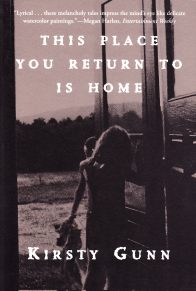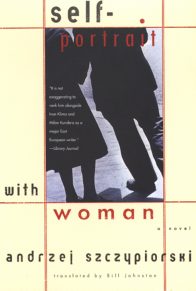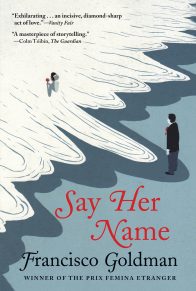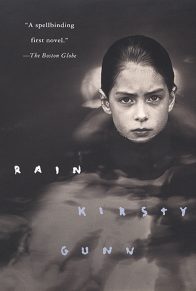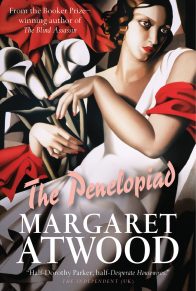The window, made of figured glass, gleamed. Around its base a broad band held the lead outlines of flowers and vines and fruits filled in with coloured glass, all the pieces within their lead moulds bright as jellies, and the thick glass plate above worked and bevelled so it caught the light and held it, turned prisms in the diamonds of glass and reflected back rainbows to the wall. That was why I visited the Portuguese cafe so often, for the coloured light the room held, the way it warmed the people who sat in it, gave lovely tints to their faces, pale rose and violet and yellow and blue.
Fernand kept the glass well polished for this reason; he was a business man. He knew how people who looked pretty in his shop would stay there and eat his cakes, as long as the light held, the warmth from the sugar and yeast rising. From out in the bare street, others would look in, be startled by how attractive everyone seemed.
They would think how delicious the plates of cakes, how even the thick white china coffee cups looked like the kinds of objects a person would want to hold. The little diamonds at the edge of the window caught a fragment of passing sun and made jewels of the visitors’ eyes. They glanced back through the glass and for a second saw everything in colour, like they were part of the pattern, like a ruby flower, like a clear green leaf.
There was a time when all the storefronts where I lived were as lovely, when all the wooden frontspieces were carved and set with glass, when the doors had brass bells that sounded one clear ring when a customer pulled the attaching cords. Now of the places I visited, only Fernand’s cafe had such fine detail. He was proud of it, and in this way it was much more than financial sense that kept him polishing the flowers and fruit. He used to take a soft cloth to the lead edging with care, dipping a soapy sponge in and out of a bucket of hot water and wiping out the glass fruits with so much attention. It was not money he was thinking about then. The generous sweeping motions of his arms as he worked all over the glass described that, turning and swilling and spinning the sponge all over, steam rising from the glass, from the bucket, from him.
When the surface was completely coated by his sponge he went indoors, emptied the bucket and filled it with cold water, took it to the glass and sluiced it clean so every last trace of soap was gone, all the bubbles stripped away by cold water. Then with a rubber spatula he cleaned even this away, in broad clean lines, bringing the spatula down, from top to bottom, fitting each line to the next until no water was left only blade cuts, long ribbons of dry.
I saw him often at the window in this way, polishing the glass in the sun on a bright morning, his white sleeves rolled up against his dark arms, his breath coming out in puffs of cloud when the weather was cold. If he was not there, his boy was there, or another boy from the family. It was always like that, for as long as I can remember Fernand kept his cafe clean, all the years that passed until I saw it again and even then it was the same as before, the same little marble tables, wooden trays of cakes, and the glass as clean. My mother said it was a European way, to care for possessions, take pride in ownership and make your things so nice. There was the way Fernand’s hand caressed the line of his counter when he spoke to her, put the coconut cakes she bought from him into the white paper bag as if they were fragile things in his hands to be kept perfect for her.
My mother loved his shop.
She loved to stand at Fernand’s counter and let him pick out his best cakes for her. She wished she could be like him, use her palm to clear a surface clean, handle plates and glasses as if they were gifts or newly bought. She wanted to be able to give me food the way he did, dusting flour off the favourite loaf, using the best knife to slice out a piece of dark moist cake. It was European, she said, and European ways she loved because they reminded her of my father and she had always loved him the best.
In her memories of that man were all her fairytales of an old country, a huge foreign continent, way east of where we lived, across miles and miles that unfolded along centuries. From flat sand lands to high sierras where dry grass grew, on to rain soaked pampas, to brittle mountains with sharp stones scattered along the side of the road, created by ice, sluices of snow. Down through green paddocks, and lavender moors, through village squares in the south, where yellow baked churches chimed midday from low towers, past dark bars and cafes where flies dozed and buzzed against the clay walls, further east, and further, to where roads interlink at one-pump gas stations and lead out to half-empty industrial plants by the sea, to deserted factories standing in the middle of a field of sunflowers, further east again to where the grass darkens to blue and grows in a thick close pile, like velvet lengths running along the flat plains on either side of the river, miles and miles, and still it goes on, her lover has pulled down that dense, velvety blue, and there finally in the distance are the frightening spires, the twisted crosses on the cathedrals, the daggered points of black roofs, cruel silhouettes of castles, tall empty houses. A flock of tiny birds, like pin-pricks, are in the violet twilight sky above the city and as you draw closer you hear them crying, “Home! Home!”
Here was a land so familiar, a place that had bred a man in it so familiar to me. My mother could never stop telling me about my father, and how he loved the place he’d come from, was so blackly proud of the cold, the pebbled streets, the dark church lit by candles’ flames that leafed the damp walls gold. He had those ways, my mother said, like Fernand had them, from his birthplace. They were there in the way he would take up a dried leaf from the table and present it to her as they sat together outside in the sunshine in the first weeks of their short marriage, in the way he ran his finger like a blade down the side of her fine face when he looked at her then.
All my mother’s stories were like this, deeply known to me by heart. So closely printed that when I found a lover for myself, I had the writing in me already that he would meet me in a European cafe, talk to me there in queer half American, with a guttural tongue. I could have been her that he would choose to give me sweet cakes that first time, pick up a fallen lump and press it into my mouth.
“Take it,” he said.
“Swallow…”
There was the way he tapped his black boot under the table, picking out the rhythm of a song only he could hear and I could have been my mother too in the way I also tried to hear it.
What was that phrase your father used to use?
I see her now, her head inclined as though she is listening for his voice in the air.
What was the word he used for love, just for me?
“You think I’m ugly now,” the man said, “and old … But that will change…”
He leaned over and ran a finger down my cheek, down my throat. “I think you might like me. Really, I think perhaps already you do.”
Inside the cafe Fernand always presided, he was proud and had to be there, serving personally if he could. Even if my mother came in for only one small vanilla roll he himself liked to pick it from the pile for her with his silver tongs, wrap it in thin paper with the edges folded under so it was a little package she could hold. Sometimes when she brought me in there, on one of her special days when she was spending the morning outside, or the afternoon, and we chose a table to sit at by the window, then Fernand would serve her that way, too, as someone who would wait, attend. He spoke with her as long as she needed, standing tall and courtly above her and as their voices murmured together I let the light reflections from the window play with my hands, turning them from crimson to purple. I opened my hand and held a piece of yellow light there in one palm, lilac in another.
After a time, Fernand would leave our table then return with the tray. In the same tradition he personally served my mother her black coffee, poured from a gold jug into a red cup so small I could have given it to a doll. On the red saucer lip he had placed a tiny paring of lemon rind, hanging like a fingernail at the rim. “For extra strength,” said Fernand. “For bitterness.”
I remember then when my mother’s coffee was laid out, he passed me a plate of yellow cakes, special cakes for children because they were decorated with coloured sugar, pink and green. There was a fizzy drink for me too, that he poured into a long glass like a grown up, with a little packet of sugar, and a spoon with a jewel on the end to stir it with.
How clever I felt, on those days, to have all the pretty things before me. At home I was never fed meals on plates or given sweet foods, my mother didn’t think of them. In the cafe, Fernand said “Let me give her a little treat,” and she allowed it, but at home I ate the foods she made, or sandwiches from school or we had buttered biscuits. She had brought me up on her own, with no help from a family, and I learned early not to ask her for sweets and candy drinks when she never took them herself. I was used to that, and besides I was young and her sweet milk probably still ran in me, mixed with my blood. I had enough in me to make me grow.
My mother used to hold me up in the air for Fernand to see.
“Look how big she is, Mr Montale!”
On those days, when she was excited, she would get out of her chair, come around to me and pick me up under the arms and lift me towards him.
“I can barely hold this girl…” Her voice would be crying out. “She’s so big now, she’s grown, don’t you think, Mr Montale? Don’t you think?”
Her eyes would be bright and wild but Fernand knew her very well, he knew what to do. Instead of saying anything to my mother he just took me from her, set me back down in my chair.
“My little lady…” He broke the cakes on my plate and put one piece into my hand.
“Eat now. I made these especially for you…”
Then my mother returned to her chair, she was quiet again. She smoothed her hair. I bit into my yellow piece, the sugar sprayed on my plate like brittle rain.
“Look how she is,” said Fernand to her, looking at her.
“Look how hungry…”
But my mother looked down, took her eyes away from him. She sipped her coffee.
Fernand was good with children because he had so many of his own, he was used to them all. My mother felt young and uncertain next to his sure touch with me. When he kissed me I felt he was my father, he reminded me of my father, like all men reminded me of my father. Like my mother said they did. She was always whispering to me, after her men friends left our flat, or sitting at the table in the cafe after Fernand had gone, “He reminds me of your father.”
Even then, when I was too young to feel anything, still I didn’t want to know her secrets. I traced with my finger the flower and stem pattern reflected from the coloured window glass clean onto the table. The colours were pale green and blue.
“He reminds me of him very well,” my mother used to say.
“You know that, don’t you? You can tell by the way I look at him that my feelings towards him make me remember that first time with your father. I can remember it, with Fernand, men like him, or with the others…”
I traced with my finger the same design, over and over. It was a pattern that was easy to do, stem to petal and around, petal back to leaf. Pale green and blue.
“I want you to listen to me,” my mother whispered. “I want you to hear how I loved your father, how he loved me. How he made me feel. I want you to believe me: we were happy, all the time we had together. I don’t mind that he’s left us, and you must never mind, you must listen. You must remember: I was your daddy’s darling…”
Her whispering became louder and louder until it wasn’t like she was whispering, more like she was talking with something caught in her throat, an infection in her throat, her voice hoarse and rasping, and her bright eyes.
I looked down at the pattern I was tracing stem to petal and around. The colours were pale green and blue.
After she had finished her coffee we would go to the counter. When I was a little older I kept the money, I looked after it in a purse, but in the early years my mother could still manage it. Her cheeks held two spots of colour as she thanked Fernand for such a lovely time again, as always, such a lovely, lovely time. Kindly, he went and fetched our uneaten cakes from the table and wrapped them up for us to take home. He always told her to put her purse away.
All the time my mother’s voice chatted on and on, it was as if she could not leave her place at the counter, other people had to wait behind in turn, waiting for her voice to finish and for her to leave. “I love coming to this place, I love it here. It’s so very European, it’s so pretty. You’re so kind, Fernand. So dear to me…”
Fernand reached over and gently, gently took her hand.
“Everything is fine, darling. But you must go home now, you know that it is time.” He kissed her hand.
“But come back very soon, promise. Au revoir.”
Then he turned away from her, it was the only way she would leave.
“Now who is next?”
He was kind with her. No matter how long she lingered with him, pretending to decide to buy more cakes, or pretending to choose a jar of sugar fruits, he was polite, he gave her his time. She prolonged as long as she could the moment when she could look into his dark eyes, when he would finally say “Au revoir”, the two foolish spots of colour on her cheek by then bright and burning.
“I don’t know what to have, it’s all so very nice.”
She moistened her lips but she was pretending, she was only pretending.
“I wonder, I wonder…”
All the time Fernand was a gentleman with her, with no loud words, only kind sentences.
“I have a lovely strawberry tart today, my Marianne…”
My mother cast her eyes down like a girl.
“I have something with a coconut crust that I know you will adore…”
And my mother took short breaths, persuading herself that she had love again, that this man was like the husband she used to know, and I was trying not to listen, holding on to the paper packet, looking down at my shoes. My mother was already so sick, unhappy. Already she was taking the powder in small dosages that would later kill her.
Just as we never had to pay for our cakes in those far-off days, and when I returned to the cafe years later, and I was the grown one by then, still Fernand would not let me pay. I was in his shop twice, maybe three times, to order milky coffee and he pushed the change back at me over the marble table as if I was still a little girl. It was the only reference to the past he gave, not taking my money. He never spoke of my mother, or of the daughter she kept with her, down by her skirts. He never reminded me who I might have been. Even when I met the man in his cafe who would take me in, and give me food, and keep me in a bed as my mother had been kept, even then, Fernand never took my money.
Instead, he simply came to stand by my table.
“There is a man here who would like to meet you…”
His voice was the same gentle voice as before.
“I don’t like him,” he said, he didn’t move at all.
“He is much too old. I don’t want you to go to him…”
I looked over and saw a man with a brown painted face sitting on his own at a corner table.
“But I follow my instructions. This man has been looking at you. He says you carry a certain face. He sends these cakes to you…” Fernand held a platter of brightly iced pastries in his hand.
“These sweet things are his introduction.”
©1997 by Kirsty Gunn. Reprinted with permission from Grove Atlantic, Inc. All rights reserved.





